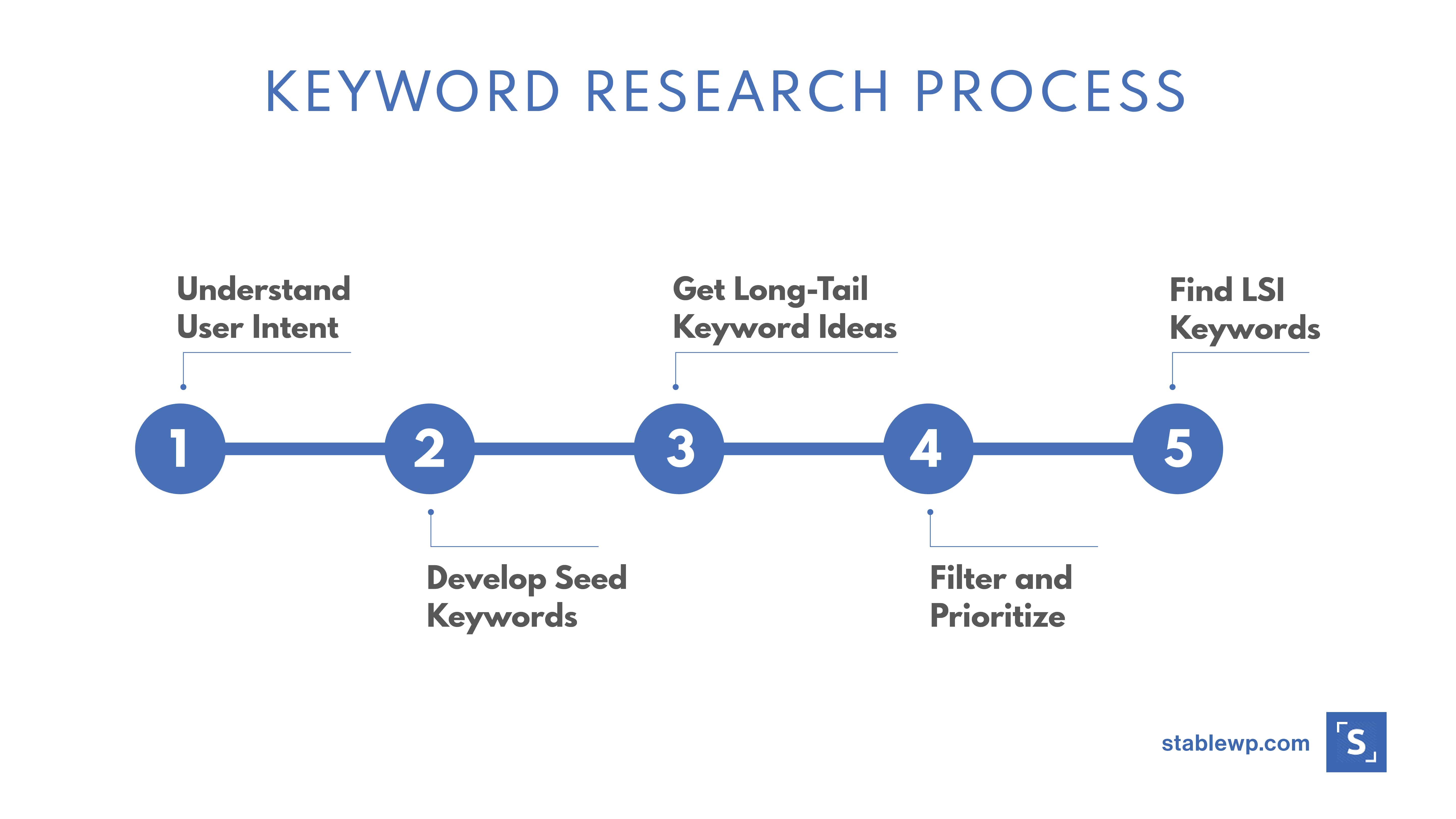Keyword Research for SEO is the backbone of any successful SEO strategy, and understanding how to execute it effectively in 2025 can elevate your online presence. Did you know that 68% of all online experiences begin with a search engine? By learning the art and science of keyword research, you can attract the right audience, rank higher on search engines, and drive more traffic to your site.
SEO success is within reach when you know how to find and leverage high-performing keywords. Whether you’re a beginner or a seasoned professional, mastering keyword research can lead to higher visibility, better conversions, and sustained growth for your website. Imagine seeing your site rise in rankings, all because you unlocked the secrets of search intent and keyword optimization. It’s time to put these strategies into practice! Start by exploring tools like Google Keyword Planner or AnswerThePublic to identify keywords tailored to your audience. Take the first step toward better rankings today—implement these strategies, refine your keyword research, and watch your website thrive.
AAA High Quality Luxury Replica Rolex Watches Online Sale At rolex datejust replica.
Best Breitling replica watches for sale, super fake Breitling Bentley watches knockoff online with cheap price wholesale.
Swiss AAA replica watches UK for sale are worth having. You can place an order online conveniently and efficiently.
Understanding Keyword Research

What Is Keyword Research and Why Does It Matter in 2025?
Keyword research is the process of identifying and analyzing the search terms that people use to find information, products, or services online. These keywords form the backbone of any SEO strategy, influencing everything from content creation to website optimization.
In 2025, keyword research is more critical than ever. With 95% of searchers only viewing the first page of search results, targeting the right keywords ensures your content appears where it matters most. Moreover, keywords with high search intent are 70% more likely to lead to conversions—highlighting the importance of aligning your strategy with user needs.
The Role of Search Intent
Effective keyword research isn’t just about choosing words—it’s about understanding search intent, which can be classified into three categories:
- Navigational: Users searching for a specific website or brand (e.g., “Facebook login”).
- Informational: Users seeking knowledge or answers (e.g., “how to do keyword research for beginners”).
- Transactional: Users intending to complete an action, such as making a purchase (e.g., “buy keyword research tools 2025”).
Addressing this intent will ensure your content can meet users’ expectations, improving engagement and conversions.
Keyword Trends to Watch in 2025
The landscape of keyword research is evolving rapidly, shaped by new technologies and user behaviors:
- Voice Search: With the rise of voice assistants, long-tail keywords and conversational phrases like “best SEO tools for beginners” are gaining traction.
- AI’s Impact: AI tools like ChatGPT are changing how users phrase queries, favoring natural language and context-based search terms.
- Local SEO: Hyper-localized keywords (e.g., “SEO agencies near me”) are essential for businesses targeting specific regions.
Adapting to these trends will keep your keyword strategy competitive, ensuring your content resonates with how users search in 2024.
Building an Effective Keyword Research Strategy

1. Identifying Your Target Audience and Their Search Intent
The foundation of an effective keyword research strategy lies in understanding your target audience. To do this, you must define their needs, preferences, and search behaviors. Consider these steps:
- Define Your Audience: Who are you creating content for? A fitness blogger, for example, might target “busy moms looking for quick workouts.”
- Pinpoint Search Intent: Categorize queries into informational, transactional, or navigational. For instance:
- Informational: “What are the best SEO tools for beginners?”
- Transactional: “Buy keyword research tools 2024.”
- Navigational: “Google Keyword Planner login.”
2. How to Brainstorm Keywords Using Competitor Analysis
Competitor analysis is a shortcut to discovering high-performing keywords in your niche. Here’s how to do it effectively:
- Identify Competitors: Pinpoint websites or businesses ranking for your target topics.
- Analyze Their Keywords: Use tools like SEMrush or Ahrefs to extract their ranking keywords.
- Find Gaps: Identify keywords your competitors rank for but you don’t. For example, if a competitor ranks for “best keyword research tools for SEO 2024” and you don’t, this becomes an opportunity.
- Benchmark Performance: Assess the search volume, competition, and intent of competitor keywords to prioritize your efforts.
This approach not only saves time but also helps you uncover keyword opportunities aligned with proven success.
3. Using Tools to Discover High-Performing Keywords
Keyword research tools are essential for building an optimized strategy. Whether you’re using free or paid tools, here’s a step-by-step guide:
- Start with Free Tools:
- Google Keyword Planner: Offers keyword ideas, search volumes, and competition metrics.
- AnswerThePublic: Generates long-tail keyword ideas based on user queries.
- Leverage Paid Tools for Deeper Insights:
- SEMrush: Provides competitor data, keyword difficulty, and search intent categorization.
- Ahrefs: Analyzes organic traffic potential and backlink opportunities for keywords.
- Prioritize Keywords: Focus on long-tail keywords with moderate competition and high intent. For instance, a keyword like “how to do keyword research for beginners” might attract a niche audience with strong informational intent.
By combining insights from multiple tools, you can create a balanced keyword list to fuel your SEO strategy.
Long-Tail vs. Short-Tail Keywords: Why Both Matter
- Short-Tail Keywords: Broad terms like “SEO keyword research” attract high traffic but face stiff competition.
- Long-Tail Keywords: Phrases like “step-by-step guide to SEO keyword research” are more specific, catering to users with clear intent and offering higher conversion potential.
Real-world Example:
A fitness blog targeting “workouts” may struggle to rank against larger sites. However, focusing on “best 15-minute workouts for busy moms” allows for better targeting and engagement.
Incorporating these strategies will enable you to create a robust keyword research framework, ensuring that your content aligns with audience needs and search behaviors while standing out in a competitive SEO landscape.
Practical Implementation of Keyword Research
1. Top Tools for SEO Keyword Research in 2024
To streamline keyword research, leverage the best tools tailored for specific SEO needs:
- Google Keyword Planner: Ideal for discovering search volumes and competition metrics.
- Moz Keyword Explorer: Offers advanced keyword suggestions and SERP analysis.
- AnswerThePublic: Generates unique long-tail keyword ideas from user questions.
- SEMrush & Ahrefs: Comprehensive tools for competitive analysis, keyword tracking, and intent categorization.
- Google Search Console: Validates keyword performance directly from your existing content.
Pro Tip: Use a combination of free and paid tools to balance depth of insight with affordability.
2. How to Organize Keywords into Topic Clusters
Organizing keywords into topic clusters improves SEO by enhancing content structure and search engine visibility. Follow this workflow:
- Group by Search Intent: Separate informational, navigational, and transactional keywords.
- Example:
- Informational: “What is keyword cannibalization?”
- Transactional: “Buy SEO keyword research tools.”
- Example:
- Map Keywords to the Buyer’s Journey:
- Awareness Stage: Use broad, informational keywords like “best SEO practices.”
- Consideration Stage: Include comparison terms, e.g., “SEMrush vs. Ahrefs for SEO.”
- Decision Stage: Target action-oriented phrases like “buy Ahrefs subscription.”
- Create Pillar Pages and Subtopics:
- Example: A pillar page on “Keyword Research for SEO” could link to subtopics like “How to Use Google Keyword Planner” and “Long-Tail Keywords Explained.”
Regularly update clusters to ensure ongoing relevance and performance.
3. Common Keyword Research Mistakes to Avoid

To maximize your SEO efforts, avoid these common pitfalls:
- Keyword Cannibalization: Targeting identical keywords across multiple pages dilutes rankings. Solution: Consolidate content or assign unique keywords to each page.
- Ignoring Search Intent: Misaligned content fails to engage users. Always prioritize intent when choosing keywords.
- Overlooking Long-Tail Keywords: These often have higher conversion rates despite lower search volumes.
- Neglecting Updates: SEO is dynamic; revisit keywords regularly to adapt to evolving trends.
Example:
Using Google Search Console, identify low-performing keywords on your site. Revamp content or add related keywords to improve relevance.
Conclusion
Keyword research is the backbone of any successful SEO strategy. By understanding your audience’s intent, leveraging advanced tools, and organizing keywords into strategic clusters, you can drive targeted traffic and enhance your site’s visibility.
Key Takeaways:
- The right tools, like Google Keyword Planner and SEMrush, simplify keyword discovery and validation.
- Organizing keywords into topic clusters aligns content with user intent and search engine preferences.
- Avoid common mistakes like keyword cannibalization to maintain rankings.
Ready to elevate your SEO strategy? Start your keyword research today contact us
FAQs Section: How to Do Keyword Research for SEO in 2024
1. What is keyword research in SEO?
Keyword research is the process of identifying search terms that your target audience uses to find content, products, or services online. By understanding these terms, you can tailor your content to meet their needs, improve search engine rankings, and drive more traffic to your website. Think of it as the foundation for any successful SEO strategy.
2. How do I find the best keywords for my website?
Finding the best keywords involves a strategic approach:
- Use Tools Like Google Keyword Planner or SEMrush: These tools provide insights into search volume, competition, and related terms.
- Analyze Competitors: Identify which keywords competitors are ranking for and fill gaps in your strategy.
- Focus on User Intent: Match keywords to what users are searching for—informational, navigational, or transactional intent.
- Long-Tail Keywords: These are often less competitive and highly targeted, increasing the chances of conversions.
3. What are the best free keyword research tools?
If you’re working on a budget, these tools are excellent starting points:
- Google Keyword Planner: Offers insights directly from Google’s search data.
- AnswerThePublic: Generates keyword ideas based on questions and phrases users frequently search for.
- Ubersuggest: Provides keyword suggestions, search volumes, and even domain overviews.
Pro Tip: Combine data from multiple tools to get a comprehensive keyword list.
4. How often should I update my keyword research?
SEO trends and user-behaviorr change over time, so it’s essential to keep your keyword strategy fresh:
- Quarterly Updates: Review your keywords at least every three months to identify trends and new opportunities.
- Monitor Performance: Use tools like Google Analytics or Google Search Console to track how your current keywords are performing and adapt accordingly.
- Adjust for Industry Changes: If your niche sees rapid changes, you may need to revisit keywords more frequently.
5. Can I do keyword research without paid tools?
Absolutely! While paid tools like Ahrefs or SEMrush offer in-depth insights, you can still perform effective keyword research without them:
- Free Tools: Use Google Trends, Keyword Planner, and AnswerThePublic for basic data.
- Manual Searches: Analyze Google’s autocomplete suggestions and “People Also Ask” sections for popular queries.
- Competitor Analysis: Check competitors’ meta descriptions, headings, and content for inspiration.
With a bit of creativity and effort, free methods can yield valuable insights to optimize your SEO efforts.





